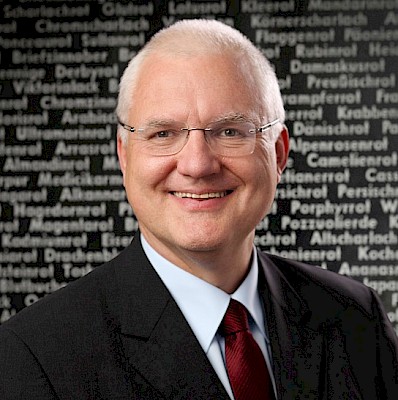Born in 1964, in 1992 Promotion as Dr. phil, in 2001 Habilitation, since 1.8.2005 Chair for New German Literature and Media at the Institut of German Philology at the Ludwig-Maximilians-University of Munich. Functions and positions: From 2007 to 2009 Dean of the faculty for Linguistics and Literature; from 2009 to 2011: Representative of Ludwig-Maximilians-University for the Bologna-Process; from 2011 to 2013: Director of the Department; from 2010 to 2016 Chair of the advisory board for Literature and Translation of the Goethe-Institut; since 2007 Contact-Professor of the Konrad-Adenauer- and from 2011 of the Hanns-Seidel-Foundation; since SoSe 2008: Chair of the Human-Science-Center; since 2014 Member of the Jury Award for Literature of the Konrad-Adenauer-Foundation. Member of the Academia Europaea, Sudetendeutsche Akademie der Wissenschaften, European Academy of Sciences and Arts; from 2011-2014 Co-Speaker of the doctoral research program »Forming and Knowing. Competence in the aesthetic subjects and fields.«
Problematic life writing - political involvement as a biographical and interpretative morphom for authors at the end of the Weimar Republic and the beginning of the NS-Reign (Heidegger, Schmitt, Jünger)
The idea of this project arises out of my current work as a senior researcher at the Center for Advanced Studies of the Ludwig-Maximilians-Universität Munich which deals with objectification (Versachlichung) and reification (Verdinglichung) as two antagonistic aesthetic principles in the media culture of the Weimar Republic. The new project emphases life writing and focusses on the question how the political involvement of authors of the Weimar Republic leads to a dominant or hegemonial interpretation of their work and to special narratives of their biografies. How can life and work be seen as specific morphomata?
The concept of a morphom could help to see the consequences for life writing and work interpretation and help to reveal the philosophical, literary and aesthetic dispositions. The project will reflect these processes in an interdisciplinary cooperation with the history of literature and philosophy as well as a political history and a history of discourses and mentalities at the examples of Martin Heidegger, Carl Schmitt, Ernst Jünger and Gottfried Benn. Subject of these considerations are self-disclosures of these authors, above all when they try to apologize themselves at later times and considerable biografies and interpretations of their life and work. In this regard I would like to write a little study which will show these developments and processes but also may help to come towards a critique of such models.
Above its specific historical reference the project will contribute to a discussion of problematic biografies in other contexts, e.g. literature of the GDR, and of interferences between different cultures of discourses. The project traces back the my long-time considerations about Martin Heidegger. At last it will help to reconstruct the history of intellectual discourses in the culture in the Weimar Republic.
